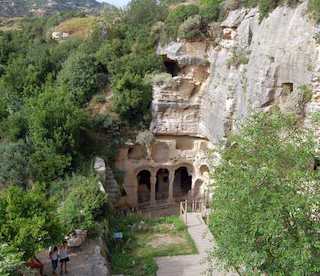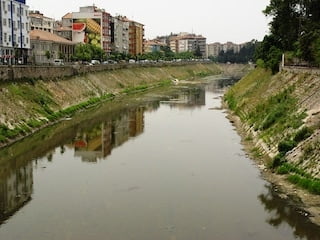

Turning south along the Mediterranean we passed the plain of Issus where the armies of Alexander and Darius fought in 333 B.C.
Further south we passed Iskenderun (Turkish word for Alexandria) which was founded by Alexander the Great.
Paul worked hard at spreading the Good News and many accepted him, but not all. Tomorrow we’ll look at…
Galatians 2
Paul Accepted by The Church
1 Then fourteen years after I went up again to Jerusalem with Barnabas, and took Titus with me also.
“Barnabas” – means “One who encourages.” His given name was Joseph, and he was a Levite from the Island of Cyprus. He was Paul’s companion on the first missionary journey.
“Titus” – A Gentile Christian who served as Paul’s delegate to Corinth and later was left in Crete to oversee the church there.
2 And I went up by revelation, and communicated unto them that gospel which I preach among the Gentiles, but privately to them which were of reputation, lest by any means I should run, or had run, in vain.
“Had run, in vain” – see 1 Cor 15:58; Phil 2:16.
3 But neither Titus, who was with me, being a Greek, was compelled to be circumcised:
4 And that because of false brethren unawares brought in, who came in privily to spy out our liberty which we have in Christ Jesus, that they might bring us into bondage:
“False brethren” – Judaizers who held that Gentile coverts should be circumcised and obey the law of Moses.

Principal river of Syria which originates east of the Lebanon ridge rises near Heliopolis in the Beka Valley of Lebanon, and flows north some 250 miles through Syria and Turkey before turning southwest into the Mediterranean south of Antioch-on-the-Orontes (Antakya) to reach the coast just south of ancient Seleucia, the seaport of Antioch.
This river is never actually mentioned in the Bible but was famous for its association with Antioch, which owed to the river the fertility of its district.
5 To whom we gave place by subjection, no, not for an hour; that the truth of the gospel might continue with you.
6 But of these who seemed to be somewhat, (whatsoever they were, it maketh no matter to me: God accepteth no man’s person:) for they who seemed to be somewhat in conference added nothing to me:
“Accepteth no man’s person” – cf. Deut 10:17; 1 Sam 16:7; Lk 20:21; Jas 2:1.
7 But contrariwise, when they saw that the gospel of the uncircumcision was committed unto me, as the gospel of the circumcision was unto Peter;
“Gospel of the uncircumcision” – Paul’s ministry was not exclusively to the Gentiles. In fact, he regularly went first to the synagogue when arriving in a new location. He did, however, consider himself to be foremost an apostle to the Gentiles.
8 (For he that wrought effectually in Peter to the apostleship of the circumcision, the same was mighty in me toward the Gentiles:)
9 And when James, Cephas, and John, who seemed to be pillars, perceived the grace that was given unto me, they gave to me and Barnabas the right hands of fellowship; that we should go unto the heathen, and they unto the circumcision.
10 Only they would that we should remember the poor; the same which I also was forward to do.

Situated in the Orontes valley on the slopes of of Mount Silipus (altitude 509 meters), 25 kilometers from the Mediterranean sea with an elevation of 80 meters, Antioch was once known as the “Queen of the Orient” because of the abundance of its goods and great monuments, and the richness of its culture.
11 But when Peter was come to Antioch, I withstood him to the face, because he was to be blamed.
“Antioch” – the leading city of Syria and third leading city of the Roman empire (after Rome and Alexandria). From it Paul had been sent out on his missionary journeys.
12 For before that certain came from James, he did eat with the Gentiles: but when they were come, he withdrew and separated himself, fearing them which were of the circumcision.
“Them which were of the circumcision” – Judaizers, who believed that circumcision was necessary for salvation.
13 And the other Jews dissembled likewise with him; insomuch that Barnabas also was carried away with their dissimulation.
“The other Jews” – Jewish Christians not associated with the circumcision party but whom Peter’s behavior had led astray.
14 But when I saw that they walked not uprightly according to the truth of the gospel, I said unto Peter before them all, If thou, being a Jew, livest after the manner of Gentiles, and not as do the Jews, why compellest thou the Gentiles to live as do the Jews?

From around 3000–1100 B.C., inhabitants known as Minoans controlled the island of Crete and ruled the island autonomously.
Despite the fact the Minoans were able to rise to a position of political and economic dominance during this time, their civilization and subsequent control over Crete was destroyed by a large volcanic eruption 300 km away, layering it in hot volcanic ash.
It is from this period onward that Crete began to fall under the control of the near-by Greek city-states and eventually the Roman Empire.
15 We who are Jews by nature, and not sinners of the Gentiles,
16 Knowing that a man is not justified by the works of the law, but by the faith of Jesus Christ, even we have believed in Jesus Christ, that we might be justified by the faith of Christ, and not by the works of the law: for by the works of the law shall no flesh be justified.
A key verse in Galatians. Three times it tells us that no one is justified by observing the law, and three times it underscores the indispensable requirement of placing one’s faith in Christ.
“By the works of the law” – Paul is not depreciating the law itself, for he clearly maintained that God’s law is “holy, and just, and good” (Rom 7:12). He is arguing against an illegitimate use of the Old Testament law that made the observance of that law the grounds of acceptance with God.
17 But if, while we seek to be justified by Christ, we ourselves also are found sinners, is therefore Christ the minister of sin? God forbid.
18 For if I build again the things which I destroyed, I make myself a transgressor.
19 For I through the law am dead to the law, that I might live unto God.

“And he is the head of the body, the church: who is the beginning, the firstborn from the dead; that in all things he might have the preeminence” (Col 1:18).
20 I am crucified with Christ: nevertheless I live; yet not I, but Christ liveth in me: and the life which I now live in the flesh I live by the faith of the Son of God, who loved me, and gave himself for me.
21 I do not frustrate the grace of God: for if righteousness come by the law, then Christ is dead in vain.
“Christ is dead in vain” – to mingle legalism with grace distorts grace and makes a mockery of the cross.
Antioch of Syria Center of Christianity
There are two cities in the New Testament by the name of Antioch: Antioch of Pisidia in Asia Minor, evangelized by Paul (Acts 13:14-50),and Antioch in Syria, an early center of Christianity.

Antioch of Syria was located on the Orontes River, about 15 miles from the Mediterranean coast. Today this is the site of Antakya in southern Turkey, close to the border with Syria.
Due to its status as a major commercial center at the junction of trade routes running eastward to Mesopotamia, westward to the Aegean and south to Damascus, Palestine and Egypt, it was one of the greatest cities in the ancient world.
Paul, in Gal 2:11-14, provided us with a look at church life in this early center of Christianity, a place where Jewish and Gentile believers came together.

The site lies approximately 1 km northeast of Yalvaç, the modern town of Isparta Province. The city is on a hill with its highest point of 1236 m in the north.
It became the base of the early church as a result of persecution, which forced followers of Jesus to flee there from Judea during the 1st century.
Paul and Barnabas spent much time in Antioch preaching and teaching; Paul embarked upon his missionary journeys from there ; and it was there that believers in Jesus were first called Christians (Acts 11:26).
Excavations from 1932 to 1939 revealed the main street of 1st century Antioch, flanked by broad walkways, temples, shops and baths. Herod the Great paved the street with marble, and Tiberius later added colonnades.
…Paul’s Jewish Opponents.
Visits: 0
